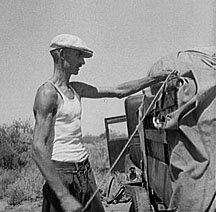 |
|
| |
Mexicans that faced discrimination in the U.S because they were Mexican also faced discrimination when they returned to Mexico because they had been assimilated into United State’s culture.1 One of the main differences was the higher personal freedom of United States citizens, so when families returned to Mexico they were viewed as too liberal. Also, the reality that even the poor in the U.S tended to have running water, electricity, and food to eat was much more advanced than poor families, who essentially had nothing, in Mexico. When repatriates would reminisce about their life in the U.S, they were perceived as being snotty by the locals.
Initially the repatriates were welcomed into the community, but this soon turned into scorn as supplies dwindled and the differences became more apparent. Children were called pochos, and were often ridiculed in school. 2 The children could not speak proper Spanish, had an accent and they mixed in several English words in their speech. Since they could not read/write Spanish, the children would often be placed in several school grades lower then they should have been. This was a greater source of embarrassment for the children.
Of course, this happened for the children that could attend school. In several of the colonies there were no schools available at all. Children were then forced to get up early to work all day, and their pay was kept by their parents to help support the family. Their futures and childhoods were destroyed. For those that could go to school, they often had to walk several miles on unpaved roads to get to school. These students were often in trouble, since schools in Mexico were stricter and followed more traditional/conservative beliefs.3
The Mexican government tried to discourage these families from settling in the cities. The governor of Sinaloa placed guards on its borders to keep repatriates from entering.4 The governments started to feel threatened by the unhappiness of the repatriates, because they carried with them very liberal ideas. They were afraid of a revolution, or political unrest. The Mexican government did not only fear the attitudes that Repatriates may have had, but they also held some resentment for a group of people who had once left their mother country in order to pursue a better life in the U.S. Because of this the Mexican government found it only logical to help out their own citizens first. Repatriates soon learned to just avoid trouble by not calling too much attention to their selves. When Repatriates did decide to return home during WWII, they received a bi surprise once they found out that their “blacklisted” status would act as a major barrier for entering the U.S. again.5
Return to History Page |

